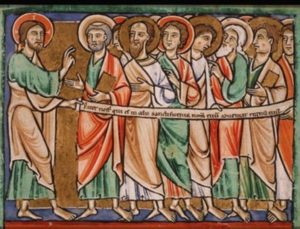Thoughts on Sunday’s Lessons for July 28, 2019
First Reading (Track One): Hosea 1:2-10
In Sunday’s Gospel we will hear Jesus teaching the apostles to pray, as he gives them Luke’s version of the familiar Lord’s Prayer, then goes on to tell them a thing or two about prayer and how it works.

Jesus teaches the apostles how to pray. (The banner they are holding contains the first words of the Lord’s Prayer in Latin. Medieval biblical illumination. (Click image to enlarge.)
First, though, in Sunday’s Track One first reading, we hear a passage from the prophet Hosea that sounds even more grim and angry than the language we’ve heard from the prophet Amos in the past two weeks. Hosea uses a strange metaphor: God orders him to marry and have a child with a prostitute, as a way to warn Israel that it faces destruction as punishment for having forsaken God’s ways. The last verse, though, offers hope for the future, promising that the children of Israel, as numerous as the sand of the sea, will be children of the living God.
First Reading (Track Two): Genesis 18:20-32
Last week in our Track Two first reading we heard about Abraham meeting God with three strangers in the desert and learning that he and his wife, Sarah, will have offspring as plentiful as the stars. Now Abraham has apparently become comfortable in his relationship with God. He bargains and argues with the Creator in hope of saving Sodom from violent destruction. Why did Sodom deserve this? God’s wrath with the Sodomites did not have to do with sexual sin, as you might assume, but with their selfish failure to be righteous. As the Prophet Ezekiel will later declare, “Sodom and her daughters had pride, excess of food, and prosperous ease, but did not aid the poor and needy.” This covenantal call to righteous action runs through the Bible from Moses through the prophets to Jesus.
Psalm: (Track One): Psalm 85
Echoing Hosea’s description of an angry God, Sunday’s Psalm sings out the grateful relief of a thankful people. They had feared that they deserved God’s fury and wrathful indignation. But now they look forward to the mercy and salvation that they hope to receive from a God who remains faithful regardless of their sins. When we listen to God, the Psalmist sings, we hear mercy meeting truth while righteousness and peace join in a kiss.
Psalm (Track Two): Psalm 138
We often pray when we’re in need. In time of trouble and fear, we cry out in our helplessness and beg God to come to our aid. But how often do we remember to thank God? Whether we are thankful for a specific blessing, or grateful for our blessings in general, we say thanks. As our mothers taught us, saying “thanks” is the right thing to do. The Psalmist reminds us that God responds when we call. God loves us and is faithful to us. God’s right hand will save us; God’s steadfast love endures.
Second Reading: Colossians 2:6-15 (16-19)
The author of the letter to the Colossians, thought to be a later follower writing in Paul’s name, reminds us to be thankful for the faith and blessings we have received through Christ. This letter to the people of Colossae, a Greek community of new Christians who may have been wrestling with the pagan beliefs of their culture, warns of false teachings. “Festivals, new moons or sabbaths,” the author points out, are only a shadow of what is to come through Christ.
Gospel: Luke 11:1-13
When Jesus teaches us to pray, he calls us to be righteous, just as the ancient prophets demanded of Israel: Honor God’s name, share our food, forgive our debts, do to others as we would have them do to us. Do these things and we help build God’s kingdom, not only in Heaven but right here on Earth. After having given the Apostles this prayer, he didn’t stop there, but went on in the following verses to talk about prayer in language rich in metaphor. How do we read his words about a persistently demanding friend who won’t give up asking his neighbor for bread at midnight until the neighbor gives in? Perhaps this underscores the importance of sharing our bread and loving our neighbors no matter what the circumstances. Just as God opens the door when we knock, so should we do the same for our neighbor.
What are “Track 1” and “Track 2”?
During the long green season after Pentecost, there are two tracks (or strands) each week for Old Testament readings. Within each track, there is a Psalm chosen to accompany the particular lesson.
The Revised Common Lectionary allows us to make use of either of these tracks, but once a track has been selected, it should be followed through to the end of the Pentecost season, rather than jumping back and forth between the two strands.
For more information from LectionaryPage.net, click here.
